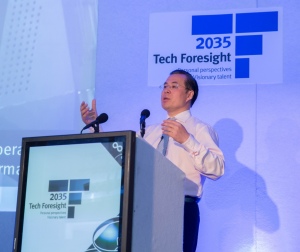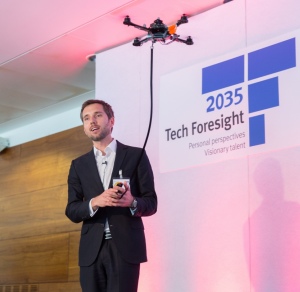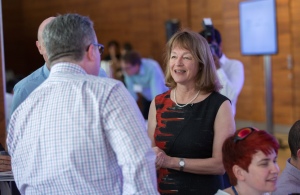Imperial explores the next 20 years of digital tech and robotics

Last week academics, industry experts and business leaders looked to 2035 to explore future challenges, emerging tech, and the next big ideas.
Computers can beat us at chess, but can they truly think? These are the kind of questions we need to address at this event
– Professor Alice Gast
President
At Imperial’s 2035: Tech Foresight event on 3 July, Imperial scientists were joined by leading figures from industry – including Sam Dickinson, Lead Inventor of Google and Mike Hearn, Lead Developer of Bitcoin, to explore the future of digitisation, automation, artificial intelligence and robotics.
The one day conference, held by Foresight Practice for Imperial Business Partners, was designed to prepare corporate leaders for the way that today’s lab discoveries could lead to future tech innovation - and how industry stands to be affected over the next two decades.
At the event, guests heard from scientific experts, experienced technology demonstrations, and stretched their thinking in breakout groups and panel discussions.
Man and machine
Keynote speaker Professor Guang-Zhong Yang, Director of the Hamlyn Centre for Robotic Surgery at Imperial and global pioneer in the field of robotics, began by discussing the way that humans and machines are already transforming the way that sophisticated tasks, from surgery to precision manufacturing, are performed. Looking ahead, he noted that an increasingly cooperative man-machine relationship will extend the range of human capability far beyond its biological limits.

Professor Guang-Zhong Yang gave the keynote speech
Other Imperial speakers who laid out their visions for the next 20 years included Dr Will Knottenbelt, from the Department of Computing. He discussed how governments, commerce and individuals could reap the benefits of digital currencies such as Bitcoin, as well as the block chain public transaction leger.
Dr Mirko Kovac, from the Department of Aeronautics, looked two decades ahead to the ways that autonomous robotic systems and people may co-exist in our future smart cities – with their human designers deriving inspiration and novel engineering principles from living organisms, such as flying insects, swarming bees and nesting birds. During the day, Dr Kovac also shared some of his insights with millions of listeners as the special guest on the BBC World Service’s Tech Tent show with Rory Cellan Jones.

Dr Mirko Kovac
They were joined by Dr Esther Rodriguz, from the Department of Electronic and Electrical Engineering – who shared how portable devices for diagnosis and health monitoring could empower individuals to take charge of their own health, and Professor Alessio Lomuscio - who explored how we can ensure autonomous machines are trustworthy as they increasingly become a part of our lives.
Incredible advances
Welcoming guests, Imperial’s President Professor Alice Gast said: “Advances in digitisation, automation, artificial intelligence and robotics have improved our world immeasurably. They have reduced time to market, shortened supply chains, improved the way diseases are treated, led to higher precision manufacturing methods, and changed how businesses respond to their customers.

Professor Alice Gast welcomed guests
"These incredible advances have also brought about profound changes in society. Our attention span is shrinking. We have less patience or desire to plan in advance. Today we can connect globally, and we can exchange ideas instantaneously. Computers can beat us at chess, but can they truly think? These are the kind of questions we need to address at this event.”
Article text (excluding photos or graphics) © Imperial College London.
Photos and graphics subject to third party copyright used with permission or © Imperial College London.
Reporter
Thomas Angus [Photographer]
Communications Division
Deborah Evanson
Communications Division